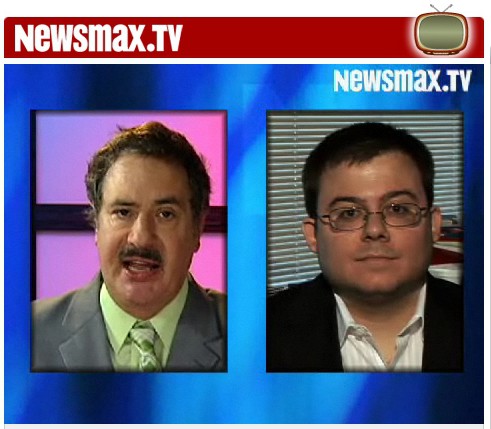One of the more far out there arguments against Net Neutrality has consistently come from conservative astroturf groups, who receive plenty of corporate funding to advocate a pro-business agenda using arguments that appeal to a conservative audience.
Newsmax, one of the more widely-read conservative websites, has gone all out on the theory that Net Neutrality is an attempt by President Barack Obama to take control of the Internet, potentially even leading to censorship. In an unconvincing video segment, Newsmax.TV reporter Ashley Martella interviews Ryan Radia, an Information Policy Analyst at the Competitive Enterprise Institute, a pro-business think tank.

Newsmax TV: Net Neutrality is a "regulatory power grab" (4 minutes)
<
p style=”text-align: center;”>(Note: Because Google video ads auto-play without your consent, which we do not agree with at Stop the Cap!, clicking the image will launch a new browser window to take you to Newsmax’s site to play the video there.)
A number of conservative blogs and news sources have latched onto one echo chamber claim: “CBS News recently reported that a cyber security bill would give Obama the emergency powers he’d need to control the Internet.” When a link to the actual report is not provided, that should ring warning bells in your head. Unfortunately, too many people simply accept statements as fact and never bother to check them out. If Katie Courac is warning the country about an Obama power grab online, I want to know about it.
Stop the Cap! is one of the few, the proud, the fact checkers.
As with most of the memes attacking Net Neutrality on political grounds, there is considerable exaggeration at work here. We could find two references on CBS News’ website to the aforementioned claim, and both turned out not to be news reports, but one blog entry and a reprinted news article from a conservative news site¹:
- Senate Proposal Gives President Authority Over Internet, by Declan McCullagh, a senior correspondent for CBS News’ Web site. (August 28, 2009)
- An Unconstitutional Internet Power Grab, by Bruce Henderson, reprinted with permission from The New Ledger, a conservative news site founded by Ben Domenech of RedState blog fame. (September 1, 2009)
An Associated Press wire story this past weekend covering proposed legislation also appears on CBS News (and thousands of other websites).
At issue is S.773, The Cybersecurity Act of 2009, a Senate bill introduced by Sens. Jay Rockefeller (D-West Virginia) and Olympia Snowe (R-Maine) to establish an effective defense against cyber attacks on the United States. Some early drafts of the proposed bill had some language, long since discarded, that could have raised privacy concerns, but it’s disingenuous at best to suggest this bill’s language, known to Newsmax and others propagating these near-hysterical conspiracy theories, would give any power to the Obama Administration to silence dissent and “control the Internet.”
In fact, this legislation does not even originate with the White House. Jena Longo, deputy communications director for the Senate Commerce committee, de-fanged the hysteria back in late August in a statement:
The President of the United States has always had the Constitutional authority, and duty, to protect the American people and direct the national response to any emergency that threatens the security and safety of the United States. The Rockefeller-Snowe Cybersecurity bill makes it clear that the President’s authority includes securing our national cyber infrastructure from attack. The section of the bill that addresses this issue, applies specifically to the national response to a severe attack or natural disaster. This particular legislative language is based on longstanding statutory authorities for wartime use of communications networks. To be very clear, the Rockefeller-Snowe bill will not empower a “government shut down or takeover of the internet” and any suggestion otherwise is misleading and false. The purpose of this language is to clarify how the President directs the public-private response to a crisis, secure our economy and safeguard our financial networks, protect the American people, their privacy and civil liberties, and coordinate the government’s response.
Radia, for his part, illustrates the effort to co-opt conservatives who distrust the Obama Administration into coming along for the ride for an industry friendly snowjob opposing Net Neutrality, with helpful prodding from Martella:
Martella: Could this lead to censorship?
Radia: There is the possibility of that. What we have seen lately is the Obama Administration and agency officials attempt to increase their power over government networks. Just a few weeks ago, CBS News reported that a cyber security bill would give Obama emergency powers to control the Internet. Under a Net Neutrality regime, we could see the FCC tell companies what data they can and cannot prioritize.
Martella’s wild “censorship” reference was jarring because it comes out of the blue with no supporting preposition. In fact, it’s pro-Net Neutrality advocates that fear providers could engage in censorship, because there have been instances where providers have done just that. Net Neutrality impacts private Internet providers by demanding they do not block, impede, or interfere with third party website content.
Radia plays mix ‘n match with two different issues to create a magical blend of nonsense — the cyber security bill which conservatives fear is an Obama power grab and Net Neutrality’s consumer protections against abusive broadband network management.
The Obama Administration’s advocacy of Net Neutrality is not about increasing power over government networks. CBS News did not report that a cyber security bill would give Obama emergency powers to control the Internet — it printed a blogger’s opinion and a reprint from a conservative news site that hypothesized such a bill, if it existed, would do that. Radia defines Net Neutrality as the FCC telling companies what data they can and cannot prioritize. Actually it just preserves the open network that has made the Internet so unique. But on behalf of his provider friends, that issue is force-merged into the Obama “Internet takeover” theory, with the hope it will energize conservatives to also oppose Net Neutrality.
Radia’s arguments are hardly convincing. He repeats the unpersuasive and undocumented fears that “Net Neutrality … is a rule that would stifle innovation, would reduce network investment, and it would decrease consumer choice in the broadband market.” It sounds like he also bought a ticket to OppositeLand, where reality is defined as the exact opposite of the truth. As is the case in Canada, it is the lack of Net Neutrality protection which stifles innovation from new high bandwidth applications that cannot succeed in a marketplace rich with Internet Overcharging schemes and speed throttles. Online video for Canada is just one of several applications that have been stifled by provider controls. There is no evidence Net Neutrality would reduce investment in networks. Customers clamoring to use those networks and the diversity of online content is much more likely to stimulate network upgrades to maintain quality of service. How consumer choice in the broadband market (which most consumers believe is hardly robust) would be impacted negatively is never explained.
Radia accidentally justifies why FCC policy alone is not enough to guarantee Net Neutrality protection when he points out Congress has not specifically authorized the FCC to get involved in the network management of service providers. A bill in the House of Representatives would do just that, however.
Radia’s assumptions that consumers are pleased with the competitive marketplace, particularly for wireless, are dubious at best, particularly when he makes this stunning statement:
“If you want a walled garden, a device where a company controls and helps guide the user experience, you can get an iPhone.”
Of course, many iPhone users have complained openly and loudly about the fact they are stuck with AT&T — AT&T retains an exclusive arrangement with Apple in the United States to sell the phone for use on AT&T’s network. They also aren’t too happy being limited by both companies in selecting applications to run on the phone, something managed by Apple and AT&T unless the customer “jailbreaks” the phone to bypass the restrictions. The result is a stifled iPhone user experience on an overloaded AT&T wireless network, higher pricing on service plans for the iPhone, and consumer choice limited to deciding whether to live with these restrictions or go without.
Radia suggests Net Neutrality is being pushed just by a handful of “so-called consumer groups that believe that since their preferences are not being matched in the market, that they should use the hand of government to force these rules upon the private sector.” His problem with that is that he believes (along with the providers who spend millions lobbying) that consumers are well served by today’s marketplace filled with proprietary business models.
Of course, real consumer groups can’t exist without consumers that actually support them, and as we’ve documented since this site launched, consumers are not well served by the limited competitive marketplace, and the abuses that come from that, and they’ve complained loudly and regularly to those providers about those practices. They aren’t listening. So consumers are turning to the public officials who regulate and oversee such markets to attempt to force them to listen.
Newsmax’s efforts to give mainstream media credibility to a sensationalized claim was only outdone by Radia himself on his own bio page:
Ryan is a frequent contributor to the Technology Liberation Front, the technology policy blog dedicated to preserving freedom and liberty in the information age. His ideas have been referenced by technology writers including Andrew Sullivan of The Atlantic’s Daily Dish, Karl Bode of Broadband Reports, and Mike Masnick of Techdirt.
Karl Bode found it ironic Radia would reference a piece he wrote, because Bode’s article trashed Radia and his friends for claiming a cable price war was resulting in consumer savings. The Techdirt piece Radia links to didn’t exactly give him a seal of approval either:
Last month, we mocked some mainstream press reports claiming both a broadband price war and the fact that broadband prices were rising. There doesn’t really seem to be much of either, as broadband prices have remained pretty constant, even accounting for promotional pricing. However, with Comcast getting ready to significantly boost speeds (yes, with its broadband caps, Ryan Radia is wondering if the actual “price war” is hidden by the fact that it’s in price per megabit.
In other words, if prices remain constant, but your speed doubles, isn’t that something of a price decrease? Radia chalks this all up to competition in the market, but it should at least be admitted that the speeds (even these higher speeds) still pale in comparison to other countries where there is much greater competition than in the US, where most people still are limited to only two real choices. Either way, as someone who’s still stuck on a home connection that runs around 500k (below the new 768k cutoff for “real” broadband) despite being in the center of Silicon Valley, I’m still not convinced that these greater speeds are so readily available yet.
We invite Radia to link to our spanking as well.
¹Using search terms “obama emergency internet” and “emergency internet” on the CBS News website.


 Subscribe
Subscribe





